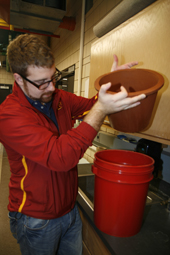 Two Iowa State University student organizations are combining their know-how and dedication to service to create more sustainable households and improve water quality in Mali, Africa.
Two Iowa State University student organizations are combining their know-how and dedication to service to create more sustainable households and improve water quality in Mali, Africa.
The student chapters of Engineers Without Borders and Material Advantage received a $5,000 grant from The Minerals, Metals & Materials Society (TMS) Foundation in support of the project “Ceramics Production for Water Filtration, Cooking Stoves, and Sustainable Households.”
With the funding, the student team plans to improve the weather resistance of buildings during the rainy season, develop technologies that will provide the local village with safe, sustainable water, and fire insulating bricks for cooking stoves to reduce fuel use and harmful smoke.
Expanding students’ horizons
The collaboration is the first between TMS, a professional organization encompassing the entire range of materials science and engineering, and Engineers Without Borders, a group that develops and implements sustainability projects worldwide.
The project inspired a unique partnership on campus, as well.
“Several Engineers Without Borders’ members are in Material Advantage, too, but typically the groups have separate activities,” said Andrew Havens, a senior in mechanical engineering and Engineers Without Borders project leader.
Material Advantage helps students learn more about materials science and engineering by creating personal, professional and academic connections. Iowa State’s student chapter has been named the nation’s most outstanding for six consecutive years.
Their knowledge of raw materials will be an important asset because the project is primarily a materials one. The team plans to use clays found in Mali to improve building materials for homes, as well as a kiln that will be used to fire ceramic water filters and bricks for clean, fuel-efficient stoves.
Emily Kuster, a junior in materials engineering and president of Material Advantage, is excited about the opportunities the project will provide to members.
“We don’t often get to see how our work can be implemented in a poverty-stricken world,” Kuster said. “We’re expanding our horizons a bit, and it’s a great way for us to help other students learn more about our discipline.”
Laying the groundwork in Ames
The team has a lot to accomplish before it sends four students and a faculty member to Africa at the end of May.
At this point, the plan is to develop several kiln designs in Ames, tapping into a variety of resources, including the Creative Artists’ Studio of Ames and others who have built kilns for pottery in the past. The group also will need to create presses that can be used to form water filters and two kinds of bricks.
“We want to have the presses completely done here with interchangeable molds so we can take the components with us and get started as soon as we get on location,” Havens said.
The students will complete some testing in Ames on the materials used to create the kilns, as well as the products they will make inside the kilns. However, due to potential variations in materials, they won’t be able to finalize a formula for a composite until they get to Africa.
While it’s admittedly a lot to tackle in a semester, the team has a slight advantage that might explain why it has set its goals so high. Several Engineers Without Borders members have worked in Mali on past projects, so the group has quite a bit of knowledge about the environment there and the resources available to them. And, because Engineers Without Borders makes five-year commitments to development projects, the group will return to Mali at least once a year to assess the project and make adjustments as needed.
The team also will share its experience at the 2010 Materials Science & Technology Conference and Exposition in Houston in October.
“We are grateful to have received the grant, and the projects we are working on are going to make a difference in the long run,” Havens said. “Students appreciate taking their technical skills and putting them back into something that’s going to help other people. It’s a humbling and gratifying experience.”
Contacts:
Richard LeSar, materials science and engineering, 515 294-1841, lesar@iastate.edu
Andrew Havens, mechanical engineering senior, 563 599-2635, ahavens@iastate.edu
Emily Kuster, materials engineering junior, 515 556-2062, ekuster@iastate.edu
Jessi Strawn, Engineering Communications, 515 294-2452, jlstrawn@iastate.edu
Teddi Barron, News Service, 515 294-4778, tbarron@iastate.edu